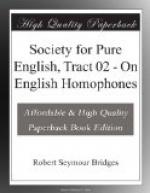Hence, all these [ore] words are being encouraged to cast off the last remnant of their differentiation, which it is admitted that they have not yet quite lost.[21]
[Footnote 21: The two editions of Jones’ dictionary do not exactly correspond, e.g. in the first edition the words boar and bore are under baw, and no other pronunciation is mentioned. But in the second edition b[ore] and b[oar] are allowed as variants. In the first edition four, fore and for are all under faw [f[e]:], and I find pour, pore, and poor all under paw, though in every case there are variants, and on p. 404 he records that shore and sure may be pronounced alike. Again, in the first edition, yerr [j[e]:] is one normal for year and also dialectal for ear (!), while in the second edition only y[ear] [ji:] is given for year, and yerr is not mentioned at all. As I am sure that this sort of stuff must be almost more tedious and annoying to read than it is to write, I desist from further details, but cannot resist the opportunity of pointing out that in their English pronunciation of Latin our classical teachers and professors have wantonly introduced this mischievous homophony of au and or into Latin, although the proper pronunciation of the ‘diphthong’ au in Latin is not like our awe, but like the ou of out. Thus with them corda and cauda are similar sounds, and the sacred Sursum corda means ’Cock your tail’ just as much as it means ’Lift up your hearts’.]
6. THAT THE MISCHIEF IS BEING PROPAGATED BY PHONETICIANS.
[Sidenote: The use of phonetics in education.]
The phoneticians are doing useful work in supplying an educational need. By the phonetic system any spoken language can now be learned quickly and easily, just as by the sol-fa system the teaching of music was made easy and simple. If a clergyman who had no practical knowledge of music were offered the post of minor canon in a cathedral, he would find it very difficult to qualify himself passably, whereas any village schoolboy could learn all the music necessary for such an office, and learn that solidly too and soundly and durably, in a few lessons, truly in a few hours, by the sol-fa method. The principle is the same in music and in speech, namely to have a distinct symbol for every separate sound; in music it is a name, the idea of which quickly becomes indissociable from the note of the scale which it indicates; in phonetics it is a written letter, which differs from the units of our literary alphabet only in this, that it has but one meaning and interpretation, and really is what all letters were originally intended to be. When you see it you know what it means.
[Sidenote: Its general adoption certain.]




